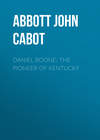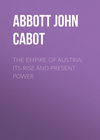Читать книгу: «David Crockett: His Life and Adventures», страница 2
Что-то пошло не так, попробуйте зайти позже
Покупайте книги и получайте бонусы в Литрес, Читай-городе и Буквоеде.
Участвовать в бонусной программеЖанры и теги
Возрастное ограничение:
0+Дата выхода на Литрес:
21 мая 2019Объем:
280 стр. 1 иллюстрацияПравообладатель:
Public Domain




















